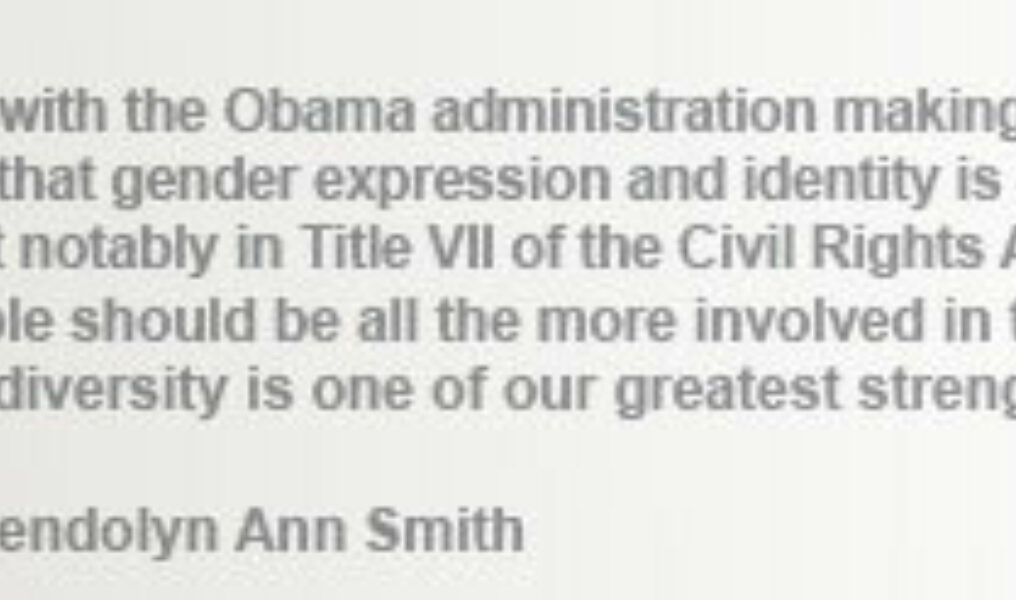by Gwendolyn Ann Smith

When we talk about transgender rights we often view this as a singular, monolithic entity, uniquely positioned and separate from everything else. Indeed, this is often the way that transgender activists and activists within other community groups may view trans issues. It is not this simple, however.
The transgender community is, itself, a widely diverse group. It does not contain one of anything. We are all races, all religions, and all backgrounds. We can be found amongst any other demographic group, and even contain an all-encompassing diversity of gender identities and expressions. We're everywhere, and contain just about any possible "type" of person.
There are some factions within the community itself that seek to divide some of this. Some transsexuals resent their inclusion in such a diverse space, and others frown on the inclusion of, say, drag kings or queens, transvestites, or those who choose a space outside of traditional gender definitions.
For all I know, we may be simply too large of a community, or trying to cover too much ground with one term. At the same time, I can't help but see that each group that falls under the transgender banner can and does transcend the gender they were identified as at birth – that just happens to be true for an awful lot of us.
While I've discussed it before, I feel its important to note another one of the big divisions: the transgender community and the larger LGBT community. Sure, not all transgender people are gay, lesbian, or bisexual identified – but that doesn't seem to be the point. We all face rights battles. The only difference is that the first three tend to be focused on sexual identity, while the latter is more an issue of gender.
Yet when a lesbian is assaulted, it is often more due to their gender presentation than their overt sexuality – and when a transgender person is discriminated against, they're more than likely to face slurs against their sexual orientation as well as their gender expression. Oh, and our marriages are often the first challenged under DOMA-like bills.
It's bigger than just the intersections between the LGBT community, however, and stretches across socioeconomic lines, racial lines, and much more.
One of the bigger examples of this, to me, is the death of Tyra Hunter. Tyra was an African-American transwoman living in Washington, DC. On the 7th of August 1995, a car struck Hunter.
As she lay bleeding, medical personnel sliced her pant leg open – revealing her genitalia. One of the DC firefighters on scene was quoted as saying, "This ain't no bitch. It's a n—–. He's got a dick and balls." At that point, the emergency personnel backed away from Hunter, and made jokes for approximately fifteen minutes. They only returned to work due to the outcry of bystanders.
She was eventually taken to the hospital, where subpar treatment may have further exacerbated her situation. Hunter died due to internal bleeding at the hospital
Was her wrongful death and ill treatment the result of anti-transgender attitudes? Yes, absolutely. At the same time, there was racist language, misogyny, and likely even some homophobia in there. Some also point to socio-economic issues causing the quality of her care at the hospital. Indeed, anti-transgender attitudes may have been at the top of the list in her care – or lack of – but there is no shortage of things that helped lead to her death.
The majority of transgender people who are murdered are transwomen of color, and often from a lower socio-economic class. Many may have been involved in sex work. Each of these may well be a factor in their death. Again, while it is key, it is more than solely an anti-transgender issue.
Congress recently allowed the Violence Against Women Act to expire. The loss of VAWA is an issue for all women: this includes transgender women and those who may have an "F" on their legal paperwork regardless of self-identity. As such, we should all be holding this congress accountable for not renewing VAWA. We could see similar issues with the Ryan White Comprehensive AIDS Resources Emergency (CARE) Act up for reauthorization in 2013, which would affect treatment for all low-income, uninsured and under-insured victims of AIDS and their families – naturally including transgender people dealing with the illness.
Sure, there are some issues that are pretty specific to transgender people. Getting a gender marker changed on a driver's license or birth certificate are going to be a greater issue for transgender people than anyone else. Fights for transgender anti-discrimination bills that include gender identity and expression to local, state, and federal law are primarily going to protect transgender people above all else
Yet with the Obama administration making it clear at nearly every turn that gender expression and identity is covered in existing law, most notably in Title VII of the Civil Rights Act of 1964, transgender people should be all the more involved in the broader fights, too.
Our diversity is one of our greatest strengths. We are uniquely positioned to secure not only protections specific to all transgender people, but to assist in larger battles. We need to understand that the rights or women are the rights of transgender women, and protections for people of color will affect transgender people of color as well.
Let us be part of that metaphorical tide that raises al ships.
Gwen Smith makes a full and complete stop at all intersections. You can find her on the web at










